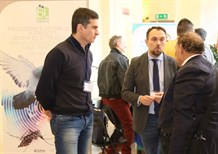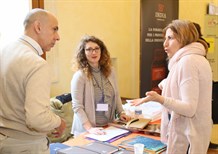Over 450 conference delegates packed the stylish Auditorium Antonianum, just up the road from the Coliseum, in Rome for two full days of presentations on 21-22 March 2018. Professionalism within the industry was the key message, with the benefits offered by EN 16636 and CEPA Certified very much to the fore.
Each spring the Italian trade association – Associazione Nazionale della Imprese di Disinfestestazione (ANID) – organises a national event which alternates between a full blown exhibition with some supporting seminars, to a more formal, full length conference. This year it was the turn of the conference.
All credit should go to ANID for attracting such a large audience of very attentive pest control professionals from within its membership – a figure far larger than is achieved for similar events in the UK. In addition, 18 commercial companies supported the event and had small table-top displays within the foyer.
Designed for a home Italian audience, the emphasis was, understandably, very much on sessions relevant to the Italian market. However, delegates were encouraged to think more widely with presentations from the US and elsewhere in Europe.
Opening the conference, ANID president Marco Benedetti, got the event off on a very positive note by highlighting the future opportunities for professional pest controllers – not the least of which is the required 60% growth in world food production in the next 40 years to meet the demand of the rising world population. Pest control will play a key role, not only in the production of the food, but also in its storage.
|
|
Looking to the future, the first two presentations given by Luciano Toma from the Istituto Superiore di Sanitá in Rome and Romeo Bellini, area entomologist from the Centro Agricoltura Ambiente (CAA) highlighted the growing threats posed by the increased number of disease carrying invasive insects in Italy, in particular from Aedes albopictus (the Asian tiger mosquito) – the known vector of the chikungunya and dengue virus.
The presentation from Agatino Russo from the University of Catania covered cockroaches and the problems they caused. He reviewed a trial set up by a team of Italian psychologists to evaluate the fear experienced by those affected by a cockroach infestation. This ranged from simple disgust to revolution and that women were twice as stressed as men, to the extent some people even moved house and changed their furniture – an action more commonly experienced due to a bed bug infestation.
|
|
|
|
Widening the scope of the conference, there was an excellent and varied contribution from four international speakers. From the US, Kevin Lemasters, president of his own EnviroPest organisation from Denver, Colorado but also a member of the National Pest Management Association (NPMA) board gave an impassioned talk on creating a company culture. Using his own company as an example, he explained how it is vital a company creates a feeling of ‘family’. As so much time is spent at work, employees must feel comfortable within the organisation, to be familiar with its identity, to understand its purpose and appreciate its values. By focusing on this, staff can concentrate on customers. “Your customers will notice the culture and care. This will differentiate you from your competitors,” concluded Kevin.
Representing the Association of Pest Control Companies in Catalonia (ADEPAP), its president, Quim Sendra, advocated ‘thinking outside the box’ – to be creative, to come up with original solutions, to be innovative and so create novel business ideas. “All of us can compete with other companies on price. But by being different we differentiate ourselves from our competitors;” Quim explained.
Extending the theme of corporate culture more directly to pest control, Henry Mott from the UK, president of Confederation of European Pest Management Associations (CEPA), gave an impassioned speech declaring: “By referring to ourselves as ‘killers’ with such company names as Rentokil, Pest Exterminators etc people view us as eliminators – our image should be much more positive – one of protectors of the environment. As an industry we must advocate professionalism.”
|
|
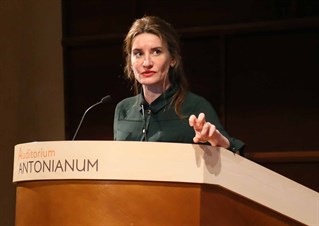 Paloma Castro, director general of CEPA Paloma Castro, director general of CEPA |
The following speaker, Rune Bratland representing the Norwegian Pest Control Association (SkaBra), illustrated what can be achieved within a country. Since 2004 when the association was formed, it has worked with government to a position now where all pest controllers have to be licensed to practice. This involves two weeks of course work, followed by in-company training and an exam. “On average it takes 20 weeks to educate a pest controller to a position of being certified. And then, after ten years, recertification is required,” detailed Rune.
Drawing this session to a close was Paloma Castro, the new director general of the Confederation of European Pest Management Associations (CEPA). Coming to the industry with a ‘fresh eye’ she exclaimed: “Our industry consists of hidden heroes. People do not know enough about us. We should be proud to be pest control professionals. The industry now has EN 16636 and CEPA Certified – the benchmark of quality and uniformity of service. Our aim is to take this to the next level – to transform this into ‘soft law’ by means of a Memorandum of Understanding.” This wouId be a major triumph, if by doing this CEPA Certified can achieve a critical mass whereby only ‘trained professionals’ can access the full range of biocides in Europe.
In the refreshment breaks, delegates had the opportunity to meet and discuss issues with the commercial companies who had sponsored the event and had table-top displays in the foyer. Next year its back to a full exhibition also in March, but to be held in Milan. Pest will be there!

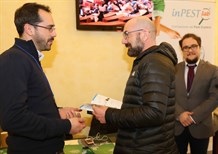
 The opening speakers, from left: Luciano Toma, ANID president Marco Benedetti and Romeo Bellini
The opening speakers, from left: Luciano Toma, ANID president Marco Benedetti and Romeo Bellini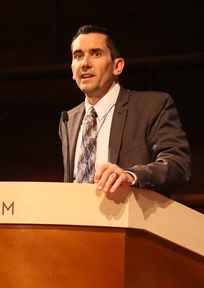 Kevin Lemaster
Kevin Lemaster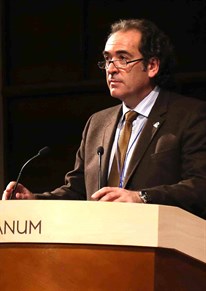 Quim Sendra
Quim Sendra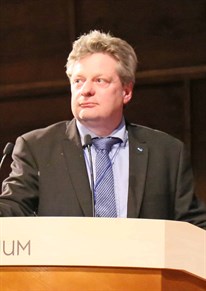
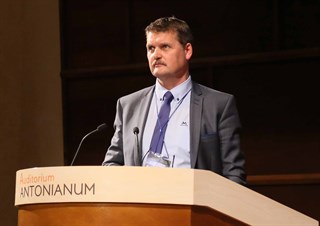 Rune Bratland represeting
Rune Bratland represeting 